
Armadillidium gestroi ‘White Spot’
This is a temp holding page and will need to be updated – Do you fancy doing the write up for this species, if so please contact [email protected]
Armadillidium gestroi is a species of pillbug, commonly referred to as the “White Dot” due to its distinctive appearance.
| Common Name | White Dot Isopod |
|---|---|
| Scientific Name | Armadillidium gestroi ‘White Spot’ |
| Taxonomy |
|
| Habitat | Armadillidium gestroi is primarily found in humid, temperate regions, particularly in areas with abundant leaf litter, decaying wood, and organic matter. It thrives in moist environments, such as forests and gardens, and can often be found under rocks, stones, and logs |
| Region | This species is native to the Mediterranean region but has established populations in various areas around the globe, including parts of the Americas and other temperate regions. |
| Lifespan (Years) | 2 |
| Diet | Decaying plant matter, leaf litter, calcium supplement, occasional protein |
| Humidity Range (%) | 60–90 |
| Temperature Range (°C) | |
| Conservation Status | Unknown |
| Coloration | The most striking feature of the White Dot phenotype is its color pattern. The base color is often a muted gray or brown, which helps with camouflage against the surface of the soil or leaf litter. Prominently, this species exhibits bright white spots or dots across its carapace, giving it its common name. The pattern can vary between individuals, sometimes resembling clouds or asymmetrical patterns. |
| Care Notes | Provide moist substrate with hiding spots. Use leaf litter, decayed wood, and moss. Ensure moderate to high humidity with ventilation. |
| Breeding Info | Can breed in captivity with stable environment. Some species are prolific, others slow. |
| Adult Size (cm) | Adult Armadillidium gestroi typically measure around 1 to 2 cm in length, though size can vary depending on environmental conditions and diet. |
| Temperament | Shy to docile, species dependent |
Was this helpful?
0 / 0